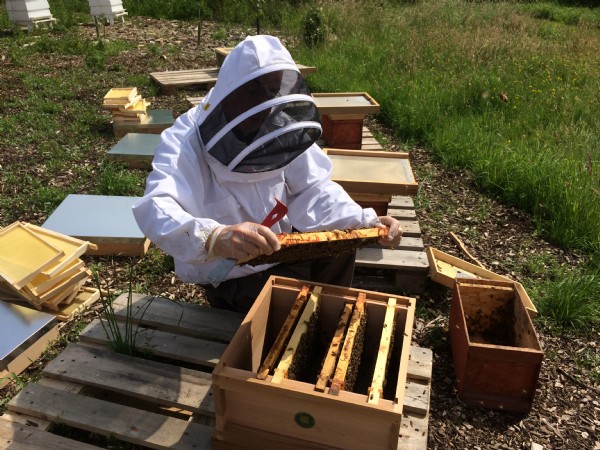

The steep decline in the population of honey bees is a well documented issue and one that could have huge effects on agriculture and the food chain, since bees, like other flying insects, help pollinate many species of crops and plants. It’s estimated that bees are responsible for pollination of the plants which produce up to ⅓ of the food we eat. They also help pollinate lots of plant species which in turn are responsible for feeding other wild creatures on our farms and therefore help support the fragile farm ecosystem. It’s worth noting that Honeybees are one of the only species of beneficial insects that can be directly and quickly introduced to a farm system by humans. However this will only be successful and productive if a sufficient amount of nectar is available from flowering plants throughout the year.
Much farmland in the UK has become surprisingly devoid of flowering plants in favour of tidy, trimmed hedgerows and the replacement of long term wildflower meadows with more productive and profitable cash crops, which offer little or no pollen & nectar. Generally even cash crops which are a good pollen & nectar sources (such as oilseed rape, lucerne & potatoes) only flower for a short window before being harvested and therefore benefit bees for a limited amount of time during the year. You could argue that bees will travel to find forage (for up to 5 miles in fact!), but the further they have to travel, the less they can collect in the time available, which affect their chance of survival. Ideally a succession of nearby flowering crops, both temporary (cash crops) and permanent (meadows, healthy hedgerows and margins) are required to successfully provide forage all year round and avoid any ‘hungry gaps’ and subsequent colony collapse.
Farmers are therefore encouraged to grow pollen and nectar mixtures on margins and headlands around their main crops via environmental schemes and subsidies. But taking it a step further, beekeeping can play an important part on a diverse farm in myriad other ways too….
On farms like ours, where sometimes we want to harvest seed from the crops (such as Sainfoin), pollinators are crucial for successful propagation. Without successful pollination many plants will struggle to produce seed. Many seed crops have failed over the years due to lack of pollination.
Having just a small apiary on your land can help to encourage the good management of pollinator mixtures, producing a healthy abundance of flowering plants, which in turn provides abundant forage for other farm wildlife too.
As well as your own personal consumption beekeeping can also generate income from the sale of honey and beeswax products. For the more accomplished beekeepers income can also be generated from activities such as swarm collection, colony & queen rearing.
Beekeeping is relatively cheap and straightforward; some important formal training (a few days and a few hundred pounds) and a small amount of equipment is all that’s required to get started. As well as being a fascinating pastime, beekeeping is a very enjoyable and rewarding skill to learn and can often help to form a bridge with the local community.
Date Posted: 17th January 2018




